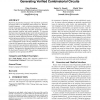Free Online Productivity Tools
i2Speak
i2Symbol
i2OCR
iTex2Img
iWeb2Print
iWeb2Shot
i2Type
iPdf2Split
iPdf2Merge
i2Bopomofo
i2Arabic
i2Style
i2Image
i2PDF
iLatex2Rtf
Sci2ools
104
click to vote
EMSOFT
2004
Springer
2004
Springer
A methodology for generating verified combinatorial circuits
High-level programming languages offer significant expressivity but provide little or no guarantees about resource use. Resourcebounded languages -- such as hardware-description languages -provide strong guarantees about the runtime behavior of computations but often lack mechanisms that allow programmers to write more structured, modular, and reusable programs. To overcome this basic tension in language design, recent work advocated the use of Resource-aware Programming (RAP) languages, which take into account the natural distinction between the development platform and the deployment platform for resource-constrained software. This paper investigates the use of RAP languages for the generation of combinatorial circuits. The key challenge that we encounter is that the RAP approach does not safely admit a mechanism to express a posteriori (post-generation) optimizations. The paper prod studies the use of abstract interpretation to overcome this problem. The approach is illustrated usi...
EMSOFT 2004 | Hardware-description Languages | RAP Languages | Software Engineering | Strong Guarantees |
Related Content
| Added | 20 Aug 2010 |
| Updated | 20 Aug 2010 |
| Type | Conference |
| Year | 2004 |
| Where | EMSOFT |
| Authors | Oleg Kiselyov, Kedar N. Swadi, Walid Taha |
Comments (0)

